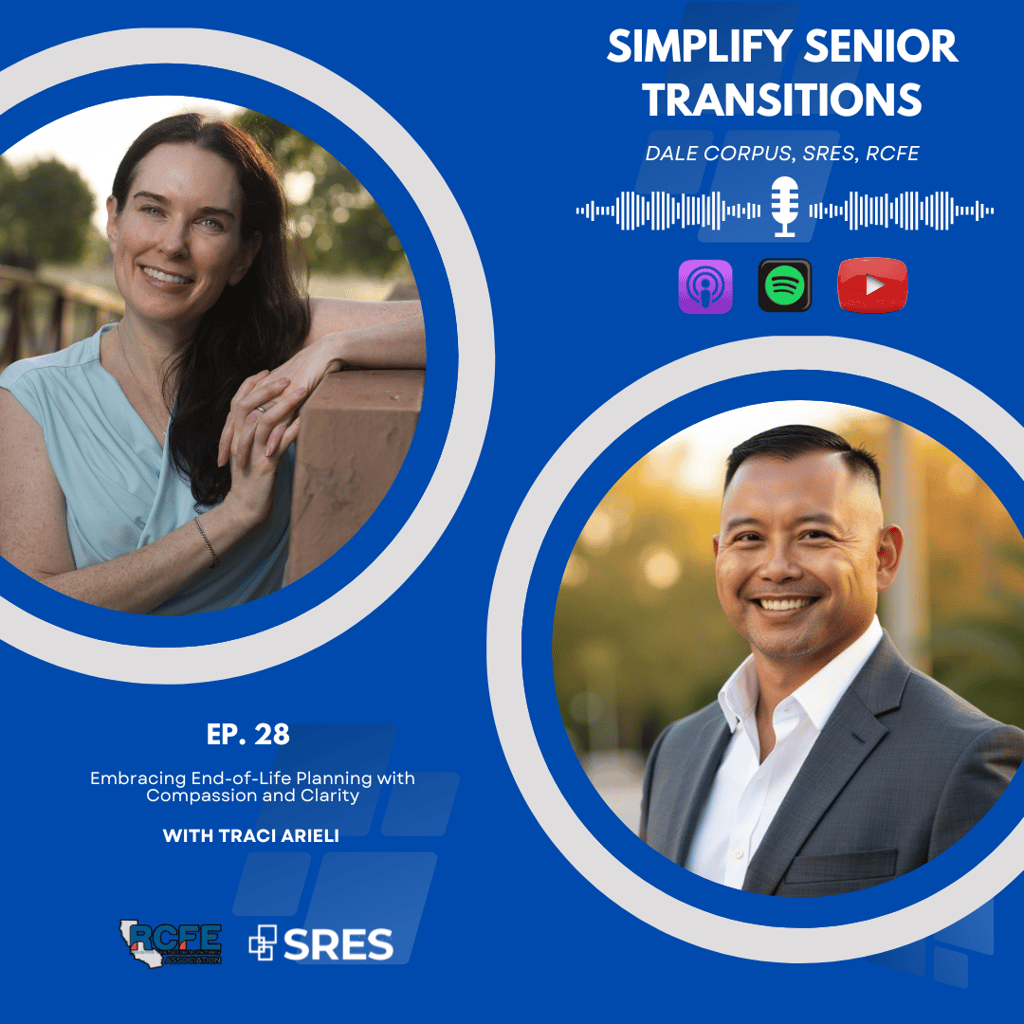How to Talk About Death (Before It’s Too Late)
End-of-life doula Traci Arieli shares how planning, legacy work, and open conversations can bring peace to even the hardest goodbyes.
Dale Corpus
6/18/20255 min read
Hey San Francisco Bay Area families, especially those of you in Contra Costa, Alameda, Santa Clara, San Mateo, San Francisco, Solano, and Napa counties!
If you're anything like me, Dale Corpus, a senior transition specialist and real estate expert, you're probably part of the "sandwich generation" – juggling work, family, and caring for aging parents. This journey can be incredibly emotional and complex, and that's why this podcast exists: to give you the tools, clarity, and confidence to make the best decisions for your loved ones and for yourself.
In a recent episode of the Simplify Senior Transitions Podcast, we had a truly insightful conversation with Traci Arieli, host of the Comforting Closure Podcast and an expert end-of-life doula. Traci creates safe, honest spaces to talk about death, grief, legacy, and emotional connection, helping families find peace and meaning in life's hardest moments. Her insights are invaluable, especially when navigating those sensitive conversations and practical steps for senior transitions.
Here's what you'll learn in this episode:
Understanding the End-of-Life Doula's Role: More Than Just Medical Care
Traci shared that her personal experiences, including a cousin's suicide and friends dying of AIDS in the 90s, where they received poor treatment, deeply shifted her perspective on death and dying and inspired her to become an end-of-life doula.
An end-of-life doula is a person who helps families get ready for a loved one's transition or death. Traci focuses intensely on quality of life, helping individuals plan the rest of their lives to be as good as possible, right up to the very end.
This involves deep conversations about advanced directives – what CPR or other medical interventions truly mean for someone, whether they are terminally ill or not. It’s about creating the most comfortable environment, considering what they want to see, hear, smell, and who they want around them. Doulas also offer vigil sitting, comfort care (non-medical massage), and crucial education for both the person dying and their family.
The Power of Planning: Finding Peace in Preparation
One of the most profound takeaways is that early preparation brings a tremendous sense of peace and control, especially for the person who is terminally ill.
While it can be emotionally challenging for family members, comprehensive planning ensures the dying person gets what they want in their environment and feels they are taking care of their family.
Traci helps with practical matters like preparing for a funeral, organizing passwords, utilities, and bank transfers, so that when the time comes, the family can focus on grieving rather than administrative tasks.
This kind of preparation directly correlates with the practical challenges families face when downsizing or selling a senior's home.
Confronting Our Cultural Silence Around Death
Traci suggests that our culture avoids talking about death largely because we're not exposed to it anymore.
Centuries ago, death was a common sight in homes; bodies were cared for by families and funerals held at home. The advent of the funeral industry moved death care away from the home, and now, what we see in movies is often a beautiful, unrealistic portrayal.
This lack of exposure leads to fear and a loss of appreciation for life's finitude. Embracing the reality of death can profoundly change how we value life, making us more direct, empathetic, and present.
Navigating the Complexities of Grief Before Goodbyes
You might encounter anticipatory grief – sadness and anxiety that begins before the actual death. This is common for both the terminally ill person and their family.
Openly talking about these feelings and finding support can be incredibly helpful.
Traci also highlighted "widow brain," a phenomenon similar to ADHD, which can affect a surviving spouse. Her practical care, like opening mail and ensuring bills are paid or groceries are bought, offers vital day-to-day support during such vulnerable times.
Hospice Care: Demystifying a Vital Support System
A common misconception is that hospice is a place you go to die. Traci clarifies that hospice is a team of people designed to make sure a person is in the least amount of pain possible, allowing them to die wherever they choose, with 80% of people wanting to die at home.
She strongly advocates taking advantage of hospice sooner – ideally within the six-month period a doctor estimates a person will die.
Most people are surprised to learn that Medicare covers hospice services, including drugs, hospital beds, oxygen, and doctors. However, it’s important to know that hospice does not cover the cost of assisted living facilities, rent, or 24/7 care.
The Lasting Gift: Preserving Memories and Legacy
Legacy work, such as life reviews, letters, and storytelling, is incredibly important for both the dying and surviving family members.
Sharing one's life story brings psychological ease to the dying person, ensuring they aren't forgotten.
For survivors, recordings (audio or video) of these stories become cherished memories, allowing them to connect with a loved one's voice and personality long after they're gone.
To preserve memories, Traci advises telling their story, continually talking about them, and even building a relationship with them post-death by revisiting letters or creating foundations in their name.
Practical Steps for Your Family's Transition Journey
Downsizing and Selling the Family Home: Traci’s emphasis on organizing practical details like passwords, utilities, and financial accounts provides a clear roadmap for families needing to sort through a lifetime of affairs. This upfront work minimizes stress during an already difficult time, making the process of selling a senior's home much smoother.
Choosing the Right Care Options: The focus on quality of life is paramount when discussing care options, including hospice. Instead of just sustaining life, the conversation shifts to what makes life meaningful for your loved one. When a loved one is in denial about a terminal diagnosis, Traci advises meeting them where they are and exploring their fears, using "quality of life" as the central guiding principle.
Managing Emotional Well-being: Understanding anticipatory grief and the impact of denial can help you approach sensitive conversations with more compassion. Remember, it’s about open communication and listening. Social media, surprisingly, has also become a positive space for education and community around grief and death, helping people feel less alone.
You're Not Alone: Let's Talk
Navigating senior transitions, from understanding care options to managing emotions and practicalities like selling a family home, is complex.
If your loved one is considering senior living and you need to figure out what to do with their home, I'm here to help.
📞 Schedule a FREE consultation with me, Dale Corpus, by clicking on the Calendarly link located in the video podcast description box or visiting www.simplifyseniortransitions.com.
📲 Have a quick question? DM me on Instagram @soldbydale.
If this interview was helpful, please make sure to like, subscribe, and share this episode with someone who might need this information.
🎧 You can listen to the full episode of the Simplify Senior Transitions Podcast wherever you get your podcasts, and connect with Traci Arieli's work at Comforting Closure.
💌 P.S. Got news or an amazing story to share? Hit us up at dale.corpus@exprealty.com and you might be featured in our next episode!
Remember, always check out the transcript for detailed insights. Happy listening!
Watch The Podcast Here



Transitions Made Simple
Helping seniors transition with ease and peace.
📍 Serving the San Francisco Bay Area
📞 GET IN TOUCH
📬 STAY INFORMED
Dale Corpus, SRES, RCFE
📱 925-380-1657
📧 dale@simplifyseniortransitions.com
🕓 Available for free 15 min consultations by appointment
© 2026. All rights reserved.
Sign up for monthly senior transition tips & real estate insights.
